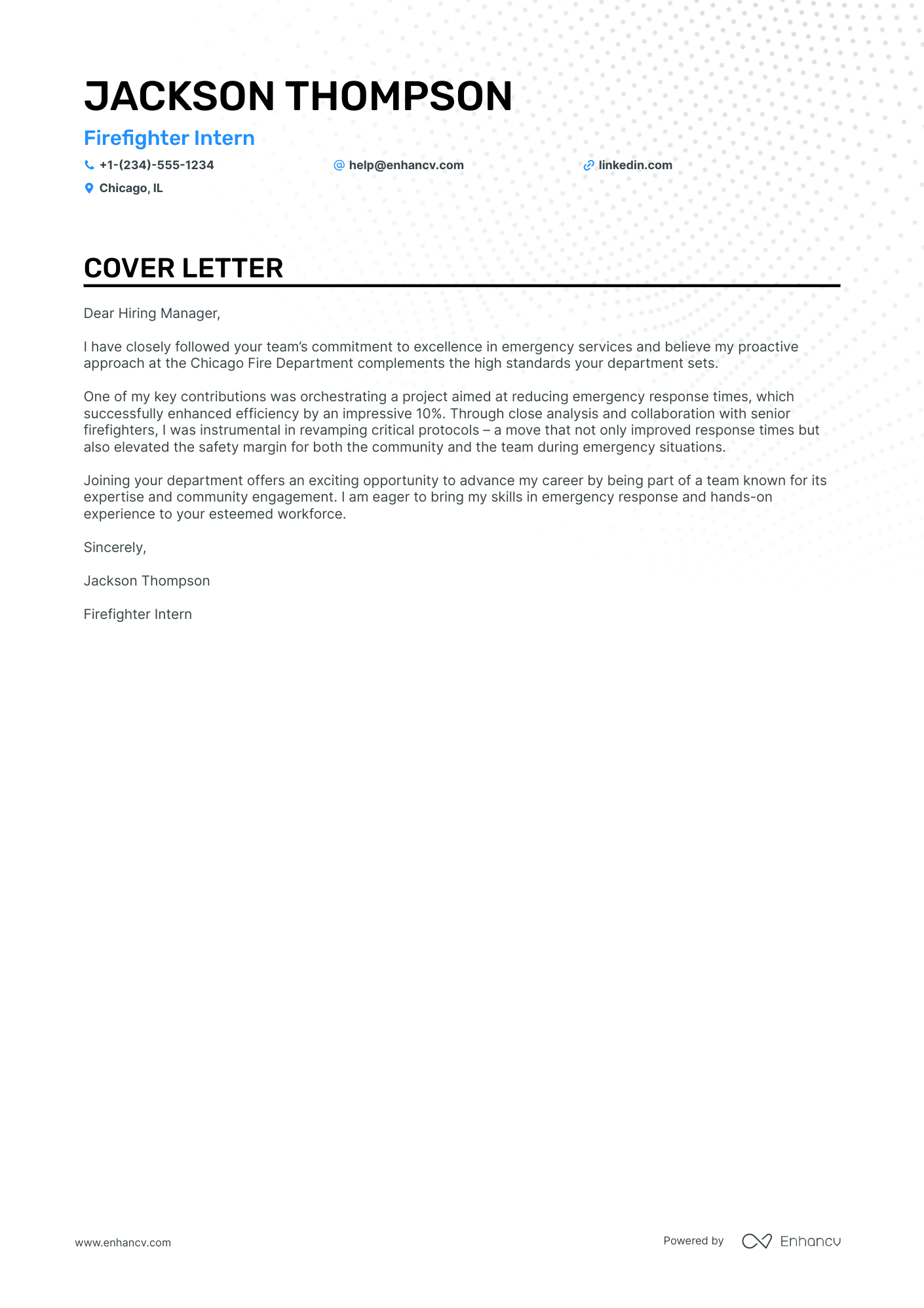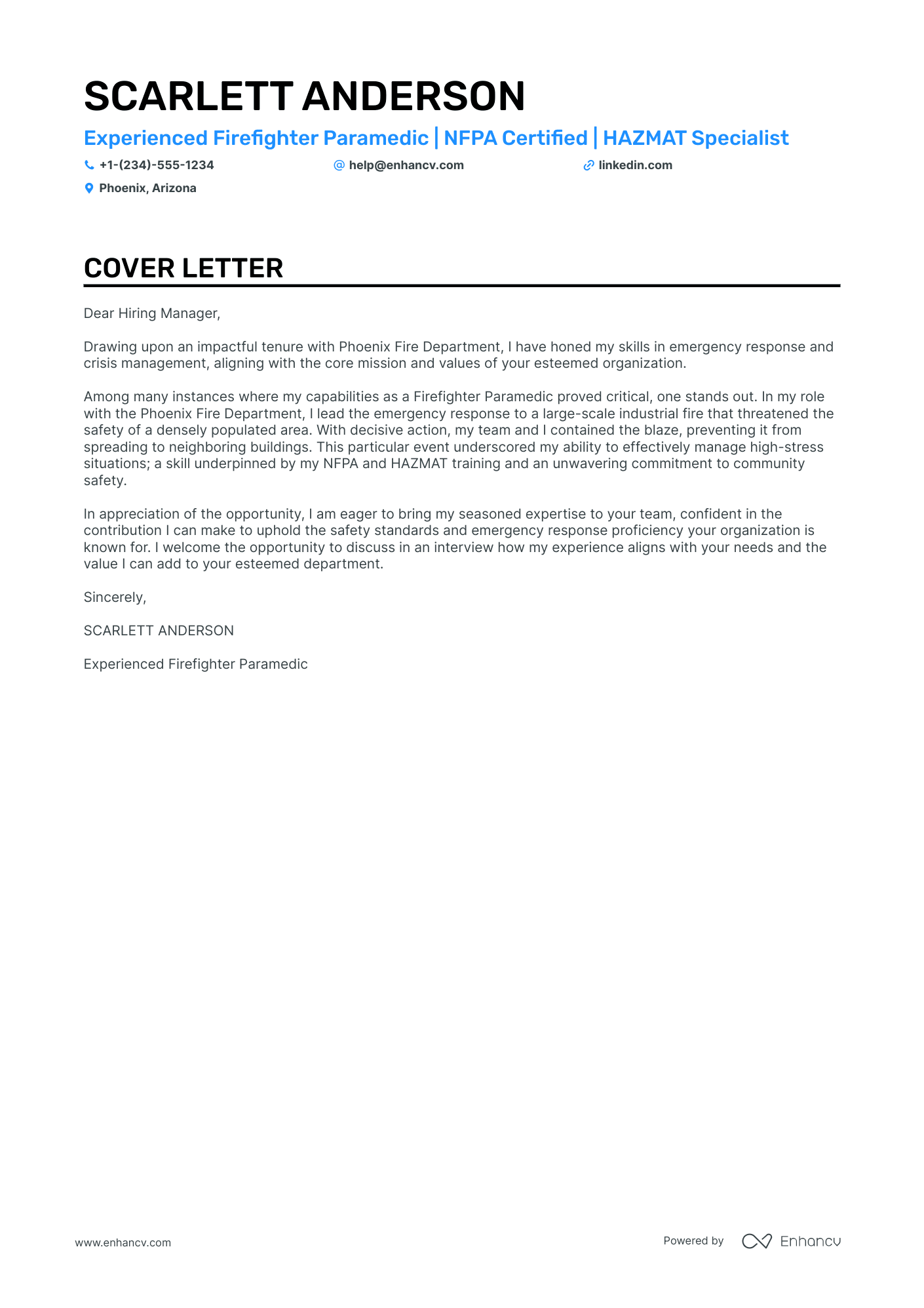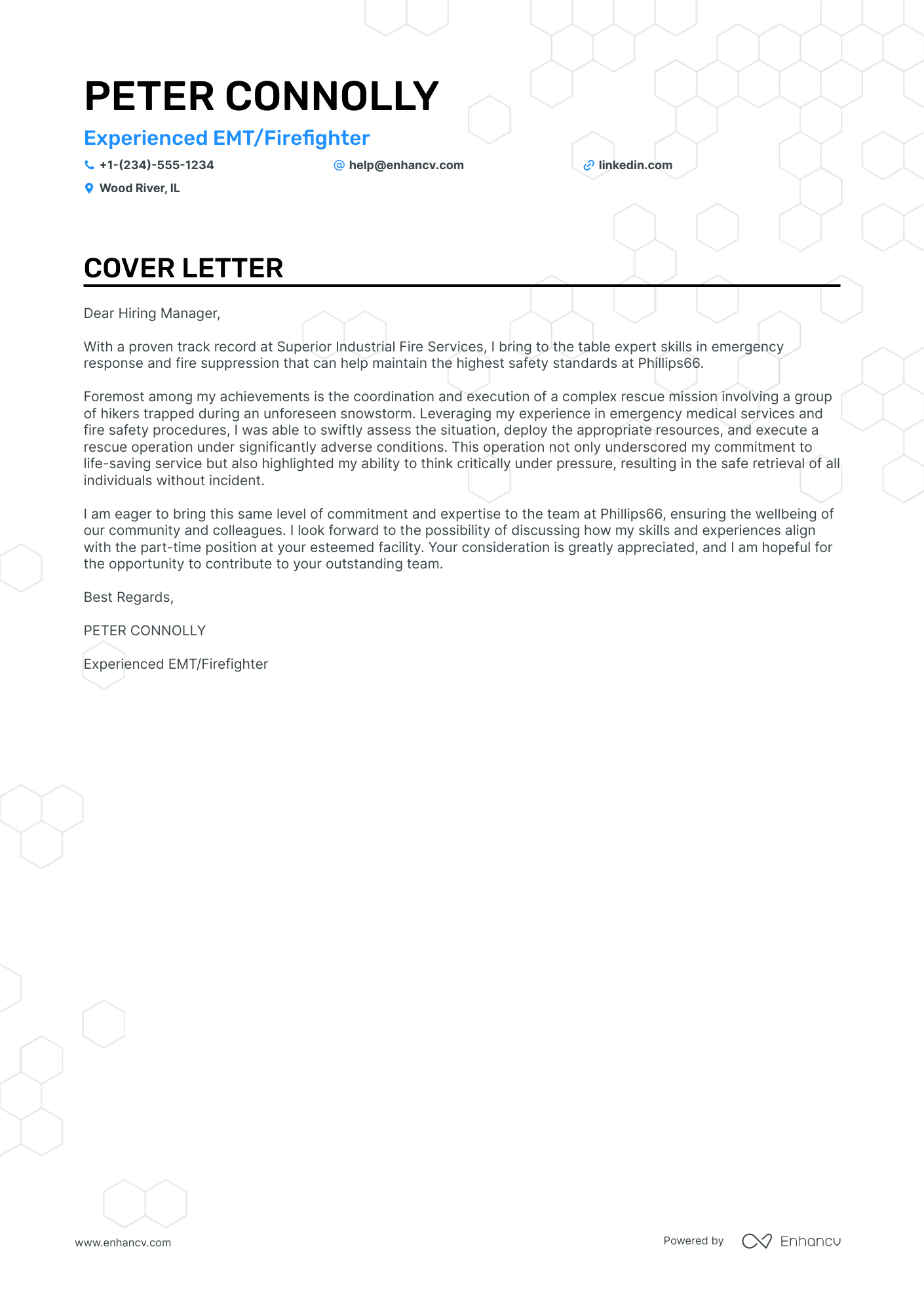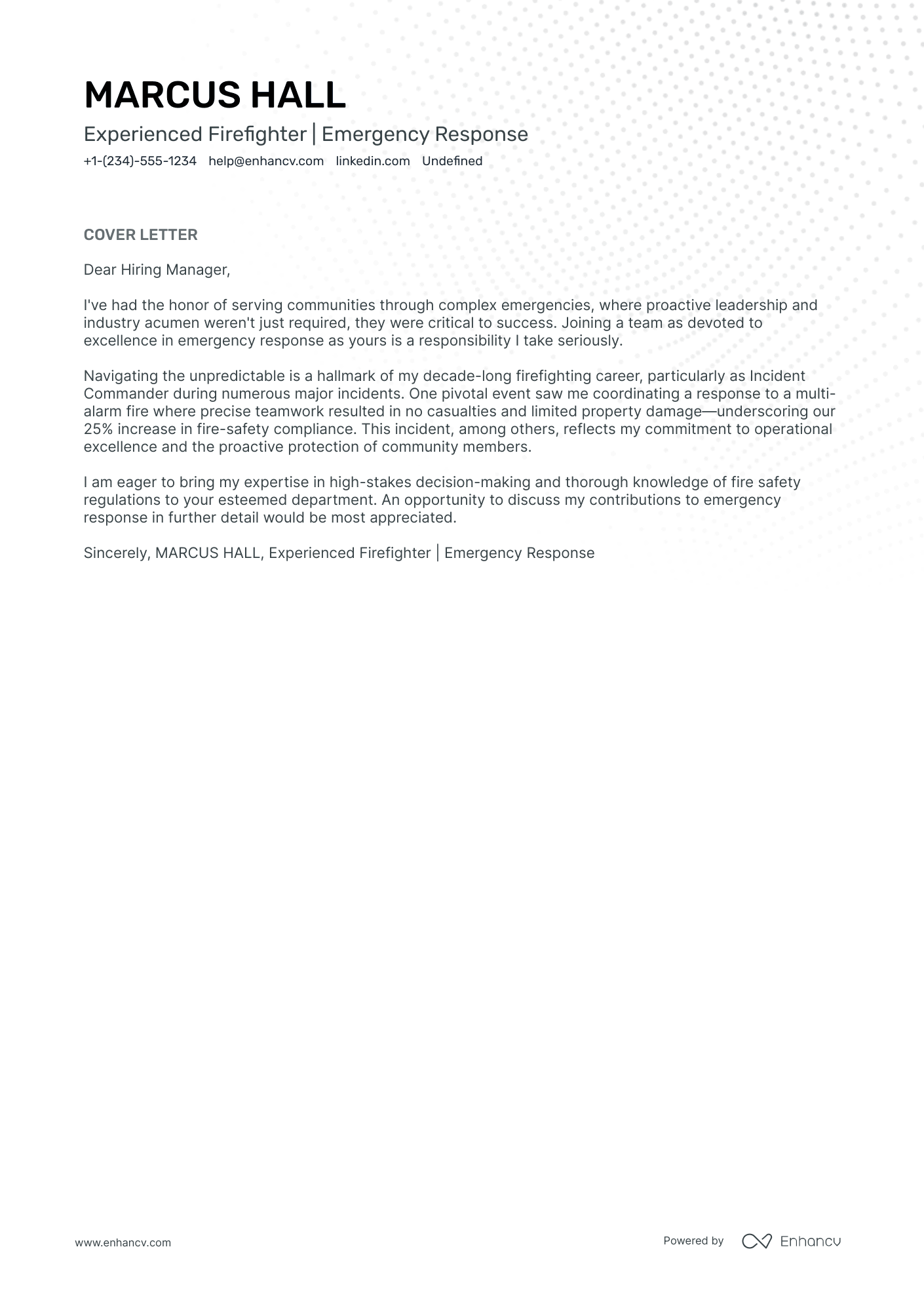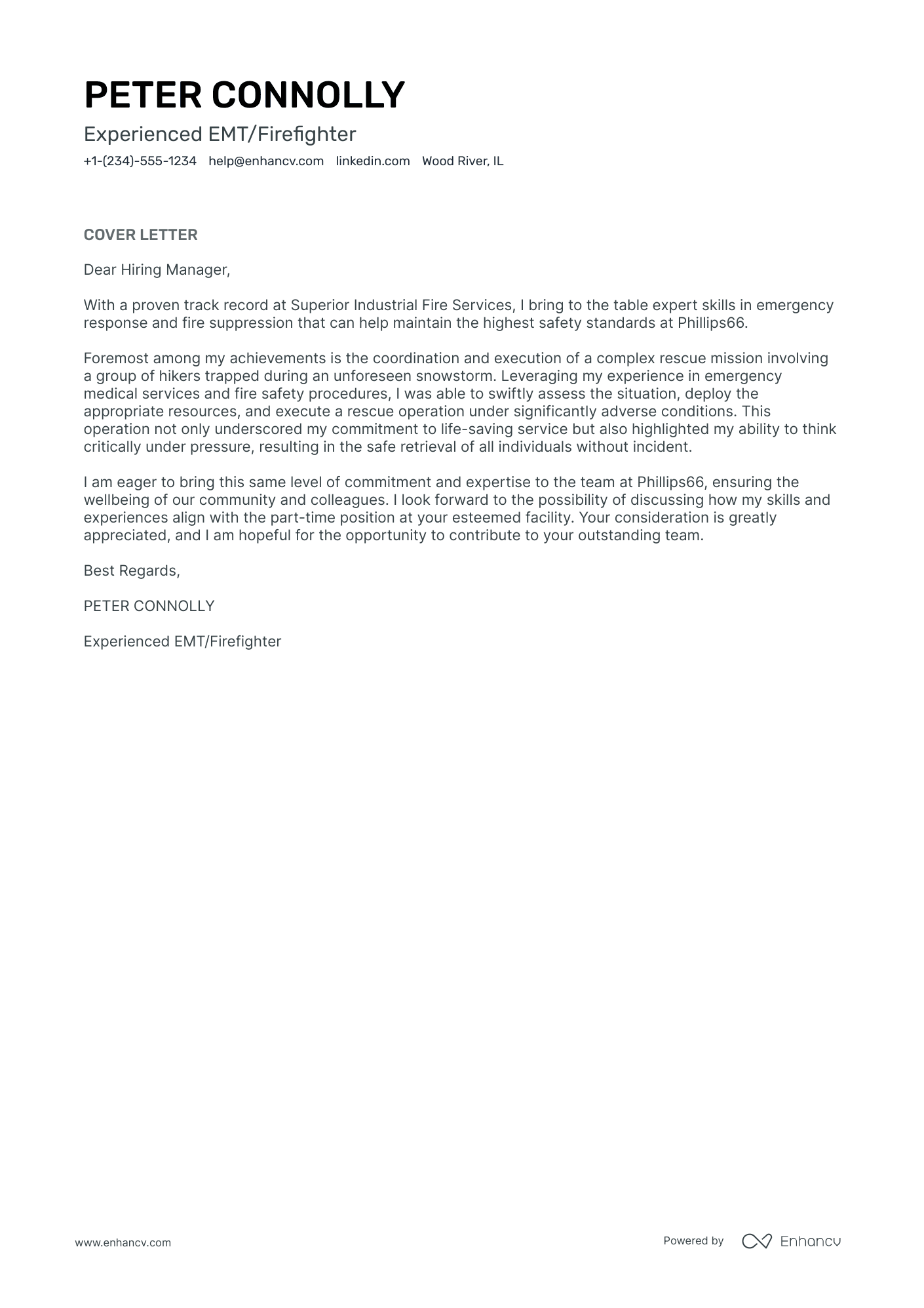Embarking on the journey to become a firefighter, you've diligently submitted applications only to realize a compelling cover letter is a crucial piece of the puzzle. This isn't just a repeat of your resume; it's your chance to shine with a powerful story of professional pride, wrapped in a formal yet authentic tone. Steer clear of clichés and keep it concise—no more than one page. Get ready to ignite the interest of your future employer without burning through unnecessary words.
- Write a firefighter cover letter that helps you stand out (and get the job);
- Understand how to start and end your firefighter cover letter with the appropriate greeting;
- What to include in the body of your firefighter cover letter to put your best foot forward;
- Your most important achievements - how to present them as part of your firefighter cover letter.
And if you want to make your life even easier, simply drag and drop your firefighter resume into Enhancv's AI cover letter generator, and it will write your cover letter for you in just a few moments.
If the firefighter isn't exactly the one you're looking for we have a plethora of cover letter examples for jobs like this one:
- Firefighter resume guide and example
- Law Enforcement cover letter example
- Security Officer cover letter example
- Security Guard cover letter example
- Retired Police Officer cover letter example
- Security Dispatcher cover letter example
- Investigator cover letter example
- Unarmed Security Guard cover letter example
- Entry-Level Police Officer cover letter example
- Incident Manager cover letter example
- Public Safety Officer cover letter example
Drop your resume here or choose a file.
PDF & DOCX only. Max 2MB file size.
Firefighter cover letter example
PETER CONNOLLY
Wood River, IL
+1-(234)-555-1234
help@enhancv.com
- Demonstrate direct industry experience: Highlighting prior work at the same company shows familiarity with the specific industrial environment and its safety protocols, which would be advantageous for the EMT/Firefighter position at Phillips66.
- Emphasize relevant incidents: Detailing a particular high-stakes emergency situation where quick decision-making and specialized skills were necessary underscores the candidate's ability to handle similar events at Phillips66.
- Focus on the desired impact: Expressing a desire to contribute to the safety and wellbeing of the employees and facilities at Phillips66 conveys a strong personal commitment to the potential role.
- Qualifications and Certifications: Mentioning qualifications, such as being an EMT, or any specialized firefighting certifications, aligns the candidate's training with the specialized requirements of the EMT/Firefighter position.
Five tips on formatting your firefighter cover letter
Do you want to make a good impression on recruiters and, at the same time, follow the best industry advice on writing your firefighter cover letter?
Make sure to include the following:
- Header and Salutation;
- Introductory paragraph;
- Body paragraph;
- Closing paragraph;
- Signature (this one is up to you).
Remember to use the same modern, simple font for your firefighter cover letter as you did for your resume (e.g. Lato, Rubik, etc.)
Ensure your firefighter cover letter is single-spaced and is wrapped around a one-inch margin, like in our cover letter templates.
Once completed, use our cover letter builder to export your firefighter cover letter in the best format to keep your information intact - PDF.
At the end of the day, your firefighter cover letter won't be assessed by the Applicant Tracker System (ATS) software, but by the recruiters. Your information should thus be legible, organized, and follow a structured logic.
Don’t stress about writing your cover letter. Use our free cover letter generator to make one in seconds.
The top sections on a firefighter cover letter
- Header: This includes the applicant's contact information, the date, and the employer's contact information, which is essential for presentation and ensures the cover letter reaches the correct individual within the fire department.
- Opening Greeting: A proper salutation addressed directly to the hiring manager or recruitment team shows respect and attention to detail, essential traits for a firefighter who must deal with the public and team members.
- Introduction: This section should briefly mention the applicant’s motivation and enthusiasm for the role, as well as highlight any previous firefighting experience or related emergency services work, demonstrating an understanding of the job's demands.
- Body: This contains one to two paragraphs detailing the applicant’s relevant skills, training, certifications (such as EMT or Paramedic), physical fitness, teamwork, problem-solving abilities, and any notable incidents that showcase their capability as a firefighter, which are crucial to the role.
- Closing: This part should reaffirm the applicant’s commitment to serving the community as a firefighter, express eagerness to discuss their qualifications further in an interview, and thank the recruiter for considering their application, all of which show professionalism and a sincere interest in the position.
Key qualities recruiters search for in a candidate’s cover letter
- Proven physical fitness and stamina: to handle the rigorous physical challenges of firefighting.
- Strong teamwork and communication skills: essential for coordinating effectively on the scene of an emergency.
- Experience in emergency response and firefighting tactics: indicates an understanding of standard operating procedures and safety protocols.
- Certifications and training in fire science, EMT, or paramedicine: demonstrates a commitment to the field and the possession of necessary lifesaving skills.
- Resilience and the ability to remain calm under pressure: crucial for maintaining focus and making critical decisions during life-threatening situations.
- Public education and community engagement experience: firefighters often participate in community safety initiatives and need to be comfortable with outreach and education roles.
How to address hiring managers in your firefighter cover letter greeting
Goodbye, "Dear Sir/Madam" or "To whom it may concern!"
The salutation of your firefighter cover letter is how you kick off your professional communication with the hiring managers.
And you want it to start off a bit more personalized and tailored, to catch the recruiters' attention.
Take the time to find out who's recruiting for the role (via LinkedIn or the company page).
If you have previously chatted or emailed the hiring managers, address them on a first or last name basis.
The alternative is a "Dear HR team" or "Dear Hiring Manger", but remember that a "Dear Ms. Simmons" or "Dear Simon," could get you farther ahead than an impersonal greeting.
List of salutations you can use
- Dear Hiring Manager,
- Dear Fire Chief [Last Name],
- Dear [Fire Department] Recruitment Team,
- Dear Captain [Last Name],
- Dear Lieutenant [Last Name],
- Dear Selection Committee,
Get creative with your firefighter cover letter introduction
Recruiters are going to assess plenty of candidate profiles for the role. Thus, anything you do to stand out will win you brownie points.
Use your firefighter cover letter introduction to share something memorable about your experience.
But before you go down the rabbit hole of creativity and humor, align your message with the company culture.
For example, if you are applying for a role in some startup, use those first two sentences to tell a funny story (about your experience) to quickly connect with the recruiter.
Storytelling in the middle (or body) of your firefighter cover letter
You've got your whole resume sorted, detailing your achievements and skills. What else can you write in your firefighter cover letter?
For starters, take the time to re-assess the job requirements and re-discover the most crucial skills and requirements (or keywords).
After making a list of these important keywords, look back on your experience to select just one of your past accomplishments.
Choose the achievement that is the most noteworthy, relevant to the role, and matches the required skills.
Use the next between three and six paragraphs to narrate how:
- you've grown your skill set, thanks to your achievement;
- you'd use the know-how you've gained in your new role;
- your accomplishment could help your potential employers grow.
Remember that recruiters don't need a retelling of your whole resume, but want to find out what makes you, you.
Ending your firefighter cover letter: a closing paragraph with a promise
If you're thinking of finishing your firefighter cover letter with a "Sincerely yours" or "Thanks for the consideration," you need to read on.
End the final paragraph of your firefighter cover letter with a twist:
- a promise - of how you'd grow as a professional, part of the company, or improve organizational metrics;
- a call to action - prompt interviewers with some follow-up actions if they are interested in your profile.
A personalized ending would surely help you to stand out by being a memorable candidate.
No experience firefighter cover letter: making the most out of your profile
Candidates who happen to have no professional experience use their firefighter cover letter to stand out.
Instead of focusing on a professional achievement, aim to quantify all the relevant, transferrable skills from your life experience.
Once again, the best practice to do so would be to select an accomplishment - from your whole career history.
Another option would be to plan out your career goals and objectives: how do you see yourself growing, as a professional, in the next five years, thanks to this opportunity?
Be precise and concise about your dreams, and align them with the company vision.
Key takeaways
We hope this firefighter cover letter writing guide has shown you how to:
- Format your firefighter cover letter with the mandatory sections (e.g. header, greeting, intro, body, and closing) and select the right font (P.S. It should be the same as the one you've used for your resume);
- Substitute your lack of professional experience with your most noteworthy achievement, outside of work, or your dreams and passions;
- Ensure recruiters have a more personalized experience by tailoring your cover letter not just to the role, but to them (e.g. writing their first/last name in the salutation, etc.);
- Introducing your biggest achievement and the skills it has taught you in your firefighter cover letter body;
- Write no more than two sentences in your firefighter cover letter introduction to set the right tone from the get-go.
Firefighter cover letter examples
By Experience
Entry-Level Firefighter
Senior Firefighter
By Role
